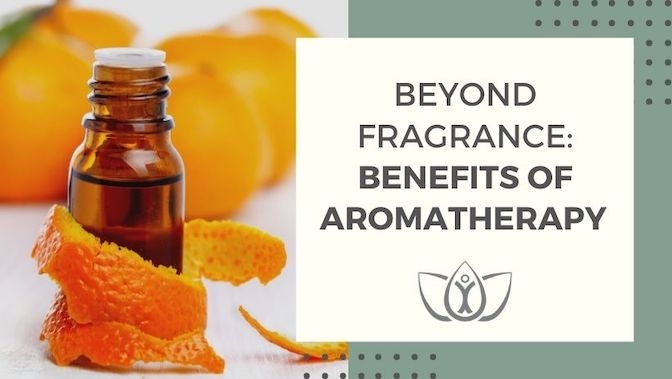People often use aromatherapy for the pleasant or uplifting scents, but the uses don’t stop there. A wide array of natural health benefits can be obtained by using essential oils.
While the fragrance itself is a benefit of aromatherapy, it’s the chemical properties of essential oils that truly help to support the body, mind, and spirit. These active constituents are so critical, that only high-quality, pure essential oils should be used. Otherwise, aromatherapy’s supportive healing qualities will be diminished or nonexistent.
It’s important to note that essential oils are different than fragrance oils. Fragrance oils are thicker and, even though they also smell wonderful, they should not be used in place of essential oils.
When using essential oils, safety is an important topic. These oils are highly concentrated and many can cause sun-sensitivity or other reactions. Therefore, it is recommended to use the appropriate dilution ratios. A 1% ratio is safe for most clients. To make a 1% ratio, use 5 drops of essential oil in 1 ounce of carrier oil. Evaluate your skin sensitivity using test patching and discontinue if irritation occurs. Lastly, always keep essential oils out of the reach of children.
So, how can aromatherapy be used in your daily life? Read on to find out 5 ways to use essential oils and aromatherapy to improve your emotional, physical, and spiritual health.
1. Hair Care
The principles of natural health go beyond supporting your major bodily functions or overcoming illness. Natural health principles can be incorporated into your lifestyle choices, like personal hygiene or beauty routines, as well. By including natural health modalities into your daily life, you will reduce your exposure to toxins.
You can use aromatherapy in your hair care routine to counteract overly dry or oily hair. You can also maintain healthy hair by using a brushing oil mixture. To help improve dry hair, mix one eighth of an ounce of cedarwood or lavender essential oil into an 8 oz container of shampoo or conditioner. For oily hair, use the same amount of shampoo or conditioner, but mix in one eighth of an ounce of lemongrass or rosemary.
To make the brushing oil, mix equal amounts of rosemary and lavender in a container. Then, place two drops of the mixture on your brush and brush through your hair several times[1].
2. Oral Hygiene
Essential oils can be used to freshen your breath, enhance digestion, or to help with a toothache or gum issues.
To freshen your breath, create an all-natural mouthwash by mixing 5 drops of peppermint essential oil, 1 ounce of cider vinegar, and 3 ounces of water in a container[2].
3. Skin Care
Our skin is porous, which means that it can absorb various substances. To reduce your exposure to unnecessary toxins and chemicals, consider using essential oils to create all-natural skincare remedies and beauty products.
Essential oil blends can be used to help with a variety of skin types and conditions. For example, you can create skincare products from floral waters that can be used for general maintenance, dry or aging skin, oily skin, or sensitive skin. To make a floral water, add a total of 5-10 drops of your chosen essential oils to 4 ounces of distilled water in a small spray bottle.
For oily skin, chose from lemon, camphor, basil, ylang-ylang, geranium, eucalyptus, and lavender. For dry or aging skin, chose from sandalwood, red sage, jasmine, rosemary, carrot seed, and rose. For general skincare, chose from ylang-ylang, lemon, lavender, geranium, and chamomile[3].
It’s important to note that sensitive skin or other skin conditions shouldn’t use these exact mixtures. For sensitive skin, add chamomile, rose, and neroli to a floral water base[4]. All other skin conditions, such as acne or eczema, will need to be researched further before applying natural skincare products.
4. Emotional & Mental Wellness
The most popularized uses of aromatherapy are for mental and emotional wellness. There are several methods to use essential oils for this purpose. You can permeate the air with a diffuser, apply the oil during a massage, inhale from the essential oil bottle, or use in a bath. Research different essential oils to find the best blend to help relieve your stress and/or tension. A few essential oils that promote a sense of calm include pine, lavender, chamomile, and orange[5].
5. Physical Applications
Essential oils can also help to support the body through its healing process. For example, aromatherapy has been shown to reduce the symptoms of conditions like headaches, chest congestion, sunburns, sore throat/cough, and indigestion.
Before using essential oils to support the body during illness, study the benefits and uses of each oil. Remedies often use blends of essential oils, each with specific application instructions and/or mixture requirements.
Learn More About the Benefits & Uses of Aromatherapy
Aromatherapy isn’t just for stress relief or wonderful fragrances. Essential oils can also be used in your daily self-care routines to reduce your exposure to toxins and chemicals, helping you feel better about the products you use in your daily life.
To learn more about the benefits of aromatherapy and how to use it for yourself or clients, check out our online Certified Aromatherapy Specialist program.
References 1-5:
Rector-Page, Linda (1992). “Healthy Healing: An Alternative Healing Reference 9th Edition.” Healthy Healing Publications, pg 35-36.


